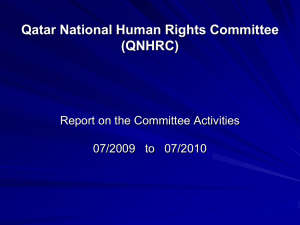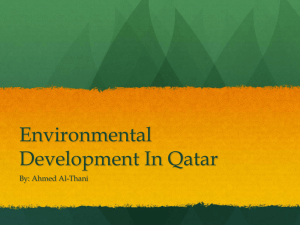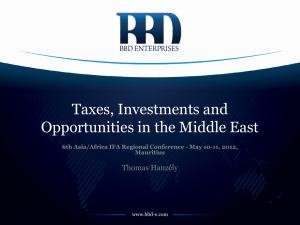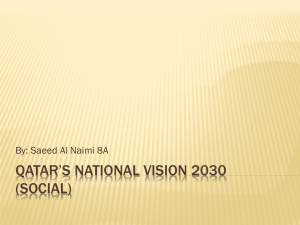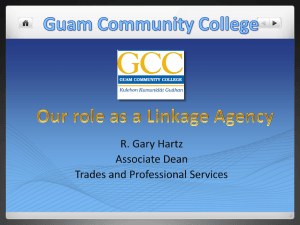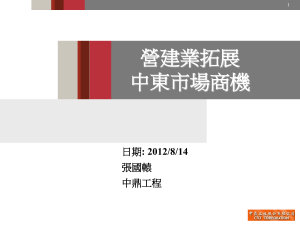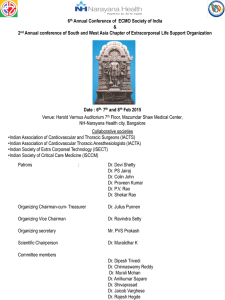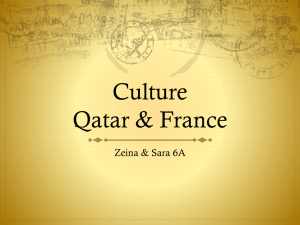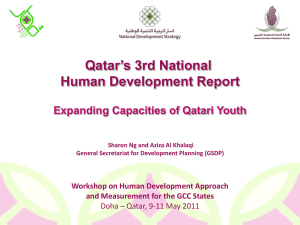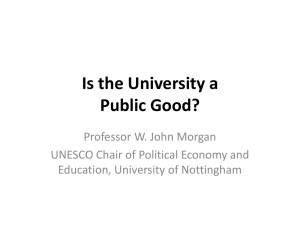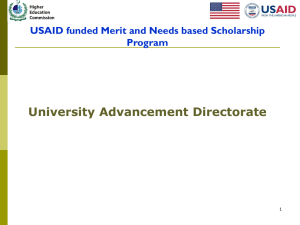Higher Education - University Center for International Studies
advertisement
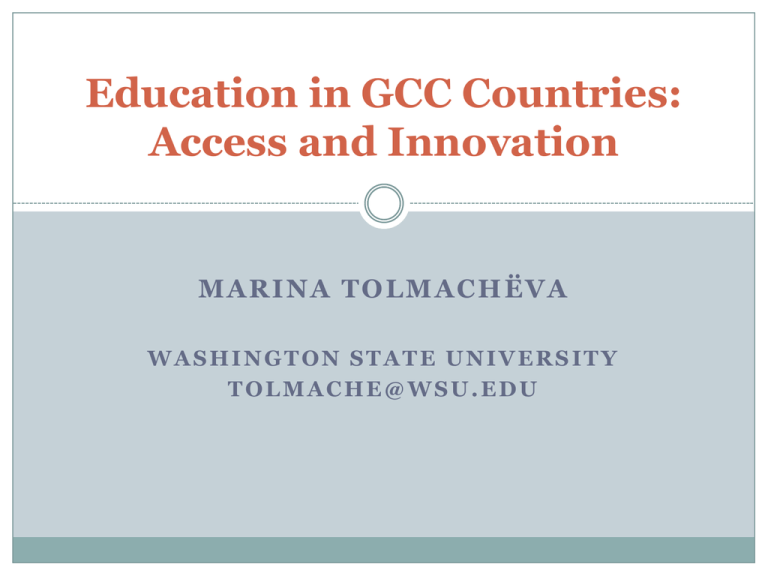
Education in GCC Countries: Access and Innovation MARINA TOLMACHЁVA WASHINGTON STATE UNIVERSITY TOLMACHE@WSU.EDU The Middle East & North Africa Youth of the Gulf The Business of Education Education Goals – Whose Goals? Women in Education Education, religion and tradition International factors • Concerns for Students • Concerns for Educators Prospects and Problems: “Youth Tsunami” or “From Oil Boom to Youth Boon”? Gulf Cooperation Council countries At first glance: Investment, Innovation, Competition Nearly half of Saudi Arabia’s own 2011 population consists of youths under age 20 Nearly one in five people living in the Middle East and North Africa (MENA) region is between the ages of 15 and 24—the age group defined as "youth." The current number of youth in the region is unprecedented: nearly 95 million in 2005. Gulf Population Estimates 2013 Saudi Arabia UAE Kuwait Oman Qatar Bahrain 28.16 mln 7.89 3.85 2.95 1.94 1.55 Education is for them… Middle East Higher Ed Background: Middle East and North African higher education historically dominated by European university models. British college model emulated by national universities after independence Formerly few American universities, originally missionary colleges Education trends in the Middle East and the Gulf Population growth Oil wealth National universities cannot cope Middle class can afford tuition Demand for Higher education Higher education in home country New type of higher education Higher education for women Higher education for expatriates Current picture U.S., British, Australian, Canadian, and Indian universities & colleges now offer postsecondary English-language instruction in the region. German & Malaysian universities are coming. American-style community colleges coming. GCC goals: Develop “knowledge economies” Become “education destinations” Reduce dependence on expatriate labor Reduce state financing of higher education Motivation for inviting US schools: Observed success of American higher education in producing Employable graduates Successful businessmen & entrepreneurs Competent professionals Research, publications, creative works American U Model: major types 1 Branches of American Universities (public & private) financed by government/state institutions 2 Private local universities with American partners financed by investors & tuition 3 “American” universities chartered in US o financed by tuition, eligible for US support Education City — Doha, Qatar Six American universities, one British university and one French university – branch campuses Virginia Commonwealth U. in Qatar , est. 1998 - School of the Arts (VCUQ). Weill Cornell Medical College in Qatar Texas A&M University at Qatar electrical, mechanical and petroleum engineering. (WCMC-Q). Est. 2001. (TAMUQ). Est. 2003 . Degrees in chemical, Carnegie Mellon University in Qatar (CMU-Q). From 2004: Business, computer science ; as of 2007 information systems. From 2011, joint program with Weill Cornell Medical College in Biological Sciences and Computational Biology. Georgetown University School of Foreign Service in Qatar Qatar). Est. 2005. Bachelor's degree in foreign service. Northwestern University in Qatar (NU-Q). Est. 2008: communication. journalism and HEC Paris, est. 2011 graduate executive education program. UCL Qatar, est. 2011 and offers postgraduate degree programmes in the areas of archaeology, conservation, cultural heritage and museum studies. ALSO: Qatar Faculty of Islamic Studies (QFIS). Est. 2007. SFS- •Liberal Arts and Science classroom buildings Lecture halls at the Weill Cornell Medical College campus in Education City Education City is an initiative of Qatar Foundation for Education, Science and Community Development RAND-Qatar Policy Institute (RQPI), which complex policy problems and helps implement enduring solutions for clients across the Middle East, North Africa and South Asia. Qatar Science & Technology Park (QSTP), a state-of-the-art facility comprising Doha Debates, a public forum for dialogue modeled on the Oxford Union debates and broadcast on the BBC. Al Jazeera Children's Channel (JCC), a panArab youth television channel which aims to strike a balance between education and entertainment. WISE Chairman H.E. Dr Abdulla bin Ali Al-Thani Why is Qatar investing so much in education? Strategic decision to spend oil income on education Knowledge economy Freedom of inquiry “Nobel for education” The World Innovation Summit for Education (WISE) WISE Prize (est. 2009) King Abdullah University of Science and Technology (KAUST, 2009) The Custodian of the Two Holy Mosques King Abdullah Bin Abdulaziz Al Saud Technocrat leadership President Choon Fong Shih 2008-2013 (ex NUS) Jean-Lou Chameau 2013(ex-CalTech) KAUST facilities and students AU Sharjah President Heath, Provost Hochstettler AUS Commencement 2012 NYUAD: “The World's Honors College“ NYUAD Students Head to Dubai for World Energy Forum KUWAIT EDUCATORS Faiza Kharafi, former president, Kuwait University Nuriya Sabeeh, former Kuwait Education Minister KuwaitiAmerican students University of Kuwait Sarah Budai, AUK alumna Secondary Ed Background English-language secondary education mostly follows British model Mostly private Elite schools with links to UK Indian & Pakistani schools Bilingual schools (English-Arabic) International faculty “American” schools for the elite “Feeder” schools for elite colleges Vera Mutawwa, founder of the British School of Kuwait Students of the American School of Kuwait The Business of Education UAE Population: 2005=4.1 mln; 2012=7.5+ Abu Dhabi – 11 universities, including NYUAD INSEAD Paris-Sorbonne AD Dubai – 18 universities, including Cass Business School U. of Wollongong London Business School Rochester Institute of Technology Bahrain: Population 1.3 mln with non-nationals 4 public & 16 private universities Bentley U (Mass.) own faculty DePaul “flying faculty” New York Institute of Technology – Bahrain University of Wales, Bangor (2 years in Bahrain, 3rd in UK) Birla Institute of Technology (India, also branches in Oman and UAE) Arab Open University Royal University for Women GCC Higher Education: whose rules? Qatar: Education City UAE, Bahrain Kuwait (AUK, GUST, AUME) Saudi Arabia Exempt from local HE regulations Foreign branches exempt from some regulations. Local private Americanor British-style not exempt. Local control No foreign universities Sports and wellness are promoted Sports are gender-segregated GCC challenges: GCC colleges are young and changing Certain freedoms may be limited GCC regulations may require Gender segregation Adherence to Islamic values For-profit status for private colleges Legally mandated differences between citizens and expatriates GCC challenges: GCC investors hesitant re US incorporation Faculty governance Cooperation with local private institutions Helping Women Hurdle Employment Barrier A discussion at "How Women Work," part of an Arcata program in Qatar. “Every year, thousands of students graduate from Arab universities and find there are no jobs” Swelling Number of Students Fighting Sexual Harassment on Campus Education vs. Security CHE, February 25, 2013 Canceled Conference Revives Concerns About Academic Freedom in the Persian Gulf The London School of Economics and Political Science abruptly canceled an academic conference on the Arab Spring at the American University of Sharjah, in the United Arab Emirates, citing "restrictions imposed on the intellectual content of the event that threatened academic freedom." Does U.S. Accreditation Mean American-Style Academic Freedom? U.S. accreditation, a sought-after prize for some Arab universities, might get pulled when American values clash with those of countries where security concerns can override academic ones. Longtime Emirati Education Minister Moves Aside Al Fanar 19 March 2013 Sheikh Nahyan Bin Mubarak Al Nahyan http://www.al-fanar.org/ http://alexandriatrust.org/our-projects/public-voice-al-fanar Concerns and hopes… “The thinker”: Barcelona's shirt sponsor is the Qatar Foundation, which funds education projects Liberal Education – A Model for Reversing Brain Drain? Can Liberal Arts Curb Extremism? Thank you. Questions?
